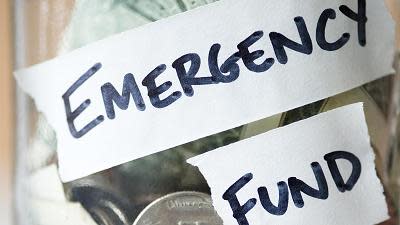A few hundred dollars does not an emergency fund make

Sometimes when it rains, it pours. A rainy day fund should be big enough to cover you in either case.
Think "what if I lost my job, what if there was another recession?" said Scott Tucker, president and founder of Scott Tucker Solutions in Chicago.
"In the world we live in today, anything can happen," said Drew Horter, founder and chief investment officer at Horter Investment Management in Cincinnati. "We're at a high end of the stock market and the low end of interest rates," he said. "People need to take a hard look at the positioning of their assets."
Still, many Americans are woefully ill-prepared for any unplanned expense, let alone a job loss, so much so that 66 million U.S. adults have zero dollars saved for an emergency, according to a recent Bankrate.com study.
Nearly half of all Americans said they either could not afford an emergency expense of $400, or would cover it by selling something or borrowing money, according to a separate report by the Federal Reserve Board's Division of Consumer and Community Affairs.
Yet in 2015, consumers spent an average $55,978 per household, according to the Bureau of Labor Statistics' most recent consumer expenditure survey. That means they are shelling out over $4,600 a month on expenses as food, housing and health care. In other words, they're spending more in one week than most people could cover with their emergency savings.
Tucker recommends having enough cash to cover three to six months of living expenses in an emergency fund, which includes rent or mortgage payments (including property taxes and insurance), utility bills, transportation costs and food.
To that end, he suggests auto-withdrawing 10 percent of every paycheck into a separate account, like a Roth IRA . "If it's in a Roth IRA, there's less incentive to touch it but they could still withdraw early without [having to pay a] penalty or taxes," he said.
Horter advises having a minimum of six and preferably 12 months in a money market account or laddered CDs to cover monthly expenditures in the case of a job loss or illness.
If possible, set excess money aside, rather than cut back, he said. "Look at take home pay versus expenses, if the difference is $300, put that money away," he said. "You have to be able to live but you also have to be able to save."
"You don't want to wind up hating that money."
More From CNBC
Top News and Analysis
Latest News Video
Personal Finance

 Yahoo Finanzen
Yahoo Finanzen 
